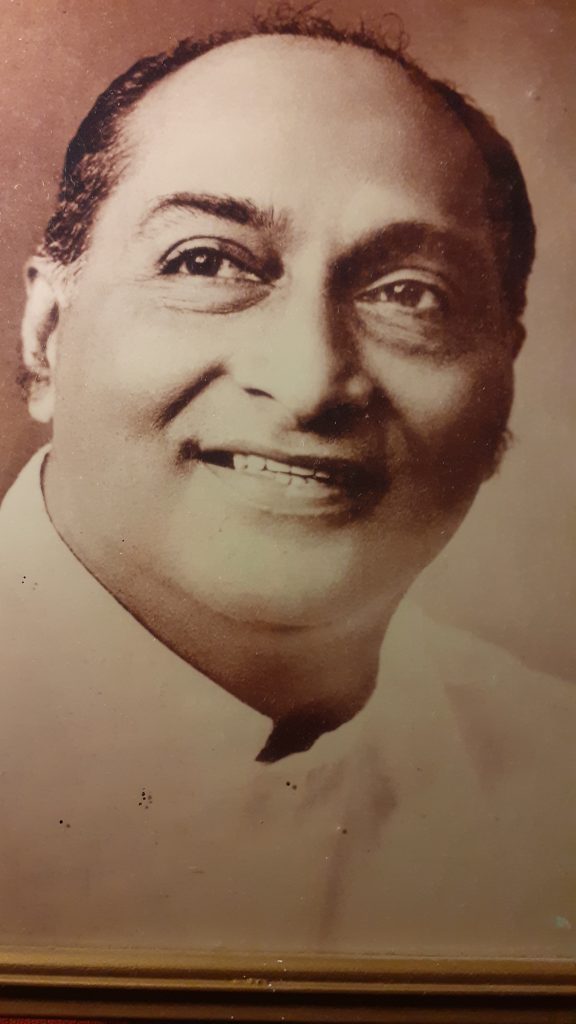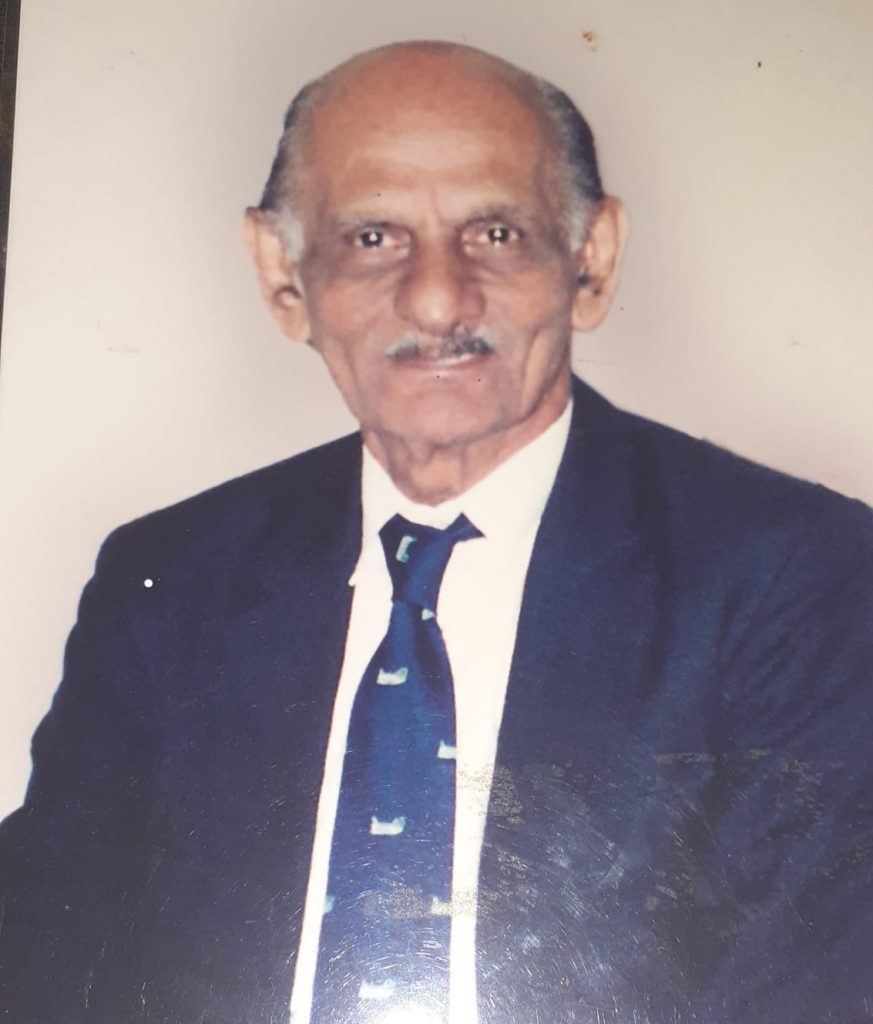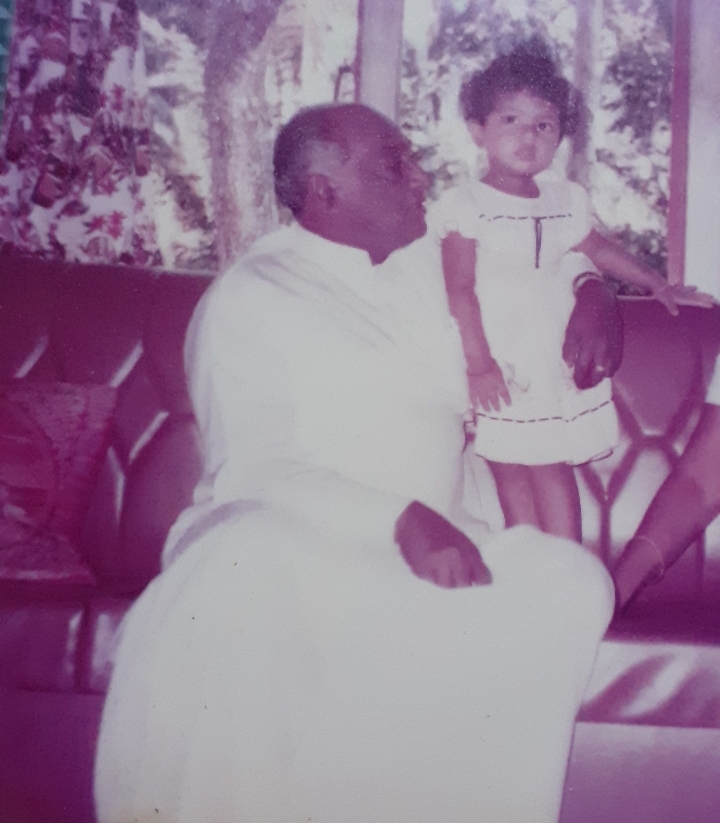I was born as the first grandchild to my two grandfathers- maternal and paternal both.Hence, I’m 200% an ‘Attygalle’, I would now say tongue-in-cheek. My grandfathers or my two ‘athas’ were cousins- their Ratnapura and Madapatha ties bonding them close. My paternal grandfather Dharmasena Attygalle’s son from Madapatha and my maternal grandfather Gamini Attygalle’s eldest daughter tied the knot in 1978. I was born a year later as the first child of two Attygalle cousins- Daya and Lakshmi and the first grandchild of two boisterous cousins. They were partners in crime. My arrival by no means made them conservative, complacent grandfathers. On the contrary, I spurred their spirits as they did mine-until the end…
He had it all- charisma, wit, unmistakable sense of humour and a large heart. My aatha- Dharmasena Attygalle embraced life with such a gusto that he lived each moment to the fullest. The open veranda of our ancestral home in the rustic setting of Madapatha was always full of life and laughter, filled with people who would turn up even at odd hours of the day. His home was rendered his character. It was open to anybody at any time of the day. Atha was born as the second son of eminent Weda Mudliyar Don Philip Attygalle from Weda Walauwa, Madapatha whose healing touch as an ayurvedic physician was sought after by many. He had six siblings- five brothers and a sister. The ‘physician gene’ of the illustrious Attygalle clan of ayurvedic physicians from Weda Walauwa in Madapatha was passed on to my grandfather.
In keeping with the family legacy, he took pains to revive ayurveda in his capacity as the Minister of Indigenous Medicine of the President J. R. Jayewardene’s regime, the first to hold this seat. For him it was a labour of love to see the Department of Ayurveda flourish.As the MP for Kesbewa electorate he lobbied for the betterment of people. His devotion to the common man transcended party politics or social standing. He gave a much needed facelift to the Piliyandala town, spearheading scores of social welfare schemes including the improvement of infrastructure and acquisition of lands for schools, hospitals and social welfare projects which continue to serve people even today. Like many of his ancestors, my grandfather gifted generously from his ancestral properties for larger causes of society.
Anybody who met him once would remember him for a lifetime. A man of style and fine upbringing who would not compromise quality, aatha was impeccably groomed, refined in taste. He travelled well, saw the world and believed in the mantra ‘live and let live.’ His love for people was his hallmark. His family legacy only made him humble. An arm around anybody’s shoulder would come spontaneously to him, even after his untainted political career. After he had given up all offices- political and diplomatic, he found solace among simple folk in his ancestral setting.
As a grandfather, aatha was a revolutionary. Defying strict meal times, he would allow malli and I to sip off his cup of midday ginger tea and feast on roasted cashew! Yet it was he again who insisted on lunuwila, heen bovitiya and much more. He would not hear of cotton-stuffed baby pillows for his grandchildren. Instead they were stuffed with dried-jasmines under his careful supervision. He added rathmal, weniwelgeta and kohomba to our daily baths as young children.
Aatha was an unconventional grandfather who would smother us openly with his affection and fuel our rebellious spirits. The grand-old four poster he shared with athamma was made our play- house. My brother and I would snuggle against him in his grand old bed. Later, he would pretend not to spot us under it, scheming pranks.
Today when I look back I’m grateful to my parents who allowed my grandfather to give us unlimited space and independence to explore and fire our imagination as young children. He was given a free reign by my parents over his grandchildren. While many sought his advice or his
healing touch in exchange of only a bulath hurulla, I watched him, the little girl I was, seated on
the short wall with an inbuilt flower box skirting our sit-out behind his chair, in wonderment, of
the electrifying effect he had on people from all walks of life. In return I learnt the art of ‘people
management.

He encouraged my brother to conquer every corner of our sprawling estate, to climb mango and guava trees and devise all kinds of wild childhood games. He was amused by a flooded drawing room with drenched teddy bears given a bath right in the middle of it! An imaginary ‘battlefield’ of my young brother’s with sand-filled glass bottles scattered and toy guns booming at the backyard only made him chuckle. Aatha enabled me a window to real life way before I tasted the real trials of it. He instilled in us the value of humility, simplicity and a sense of social justice.
Having given up his political posts he set the example of never compromising one’s conscience. He set the example to my brother and I to never lose our good sense of humour and above all the common touch. An enigmatic man with a heart of gold and a beautiful smile, I celebrate my aatha every day. His beautiful portrait which stands on my working desk is a constant reminder that he is always with me…
My other atha- Gamini was born to a large family of 14 children in Weralupa Attygalle Walauwa in Ratnapura. Half of his siblings, as atha would tell me later, were named in honour of the British monarchy- Justin, Michael, Alexander etc. And the other brood in spirit of nationalism- Dhanapala, Nanda, Kusuma and so forth. Clearly atha belonged to the latter although he would candidly say that ‘sudda bugger should have never left the country!” Both my athas were romantics. They were both attractive men too. And they knew it and exploited it!. Gamini atha was often the first choice of a best man among his ‘Madapatha’ cousins. While Madapatha atha stole the heart of his beautiful and graceful neighbour Seline Grace, Gamini atha stole that of his one-time pupil, the lovely Ratnavali. The latter would go to the extreme of labouring to find her a boarding place with no male spirit anywhere in vicinity! He found the ideal place, strategically located- walking distance from his home and easily accessible by the school she was then teaching at, barely out of Ferguson’s High School! Each time I pass that house still on my way to Ratnapura, atha comes to my mind strongly… Having read Austen’s Pride and Prejudice the first time when I was around 14, I would call atha
Mr. Bennett to the amusement of my mother- the eldest of the five girls. Although a loving father, atha never took parental duties so seriously. Just like Mr. Bennett, he would find athamma’s efforts amusing! I was the most fortunate grandchild of atha’s who could enjoy him the longest. I would cherish his visits to Madapatha. He would join malli and I in a game of cricket. He was a great swimmer
too attributing his skill to his exploits at Katugas ella. The two grandfathers often forgot their age in their element during these reunions! After a drink or two, Gamini atha would loosen his tongue to the merriment of malli and I and to the fury of athamma! The greatest poets and novelists would come alive… the great Bard would be quoted many times. He would wrap it up all in his most memorable quote, “behind every tragedy there is a woman!” Atha and I have shared a lot. We have read poetry together, written commentaries together, but my all-time favourite is ‘Who is the woman?”- his very original. I have made many of my ‘old-school’ journalist-friends laugh quoting him. One would remark chuckling, “what a wise man, wish I met him”!
I would savour his anecdotes about his illustrious ancestors- Sir Nicholas Attygalle- first Ceylonese Vice Chancellor, Cyril Attygalle who wrote ‘Girl of my dreams’ (later sung by Elvis
Presley) and so on. Thanks to atha, I discovered ‘who is who’ and ‘who did what’. Atha took immense pride in my early days in journalism. He would faithfully follow my articles and collect
them.

At my wedding, atha would slowly corner my newly wedded husband and whisper, “you lost your bachelor’s and she gained her Masters!.” Atha never hesitated to favour me and our youngest cousin-Lanchana (Lanchi). It was the two of us who could relate to him best. Lanchi doted on atha. He would listen to her baby nursery rhymes and poetry with delight. Atha would have beamed with pride if he saw the exotic beauty with brains Lanchi had turned out to be today. Although atha was fortunate to know what his first great-grandchild (my daughter) was on the way, sadly he couldn’t live long enough to see her. Atha closed his eyes peacefully while reading the Sunday paper. I was only three months pregnant.
I envy both my athas for their ball of a life. They lived and let live and went on their last journey at kings- beautiful until the end. They never withered, never lost their spirits to the end- they were both gone in a blink of an eye… Doyen of Sri Lankan journalism, D.B Dhanapala commented about Attygalle’s in his book Among those Present: ‘there is a pride that passeth understanding in that aristocratic outlook on the edge of arrogance which seems to indicate that it did not care to whom the world belonged at the moment for it would have to come to them in the end.’ Indeed the world came to both of them…

